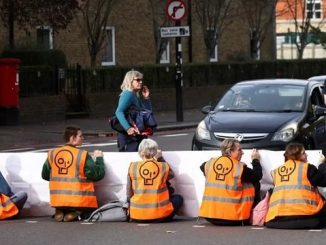
A new law in England and Wales will force criminals to attend court while their sentences are read out, with the offenders facing two years longer behind bars if they still refuse to sit in the dock.
The government confirmed its plans to introduce the reform on Wednesday, promising to create a new power for judges to make the order.
The change will also allow custody officers to use “reasonable force” to make offenders appear, “meaning every effort will be made for victims and their families to see justice delivered”.
However, the timetable for the legislation to be brought in is not yet clear – with Prime Minister Rishi Sunak only saying it would happen in the new session of parliament, starting in the autumn.
And the decision on whether to make the order will remain with judges, while prison staff and custody officers will be left to decide whether the use of force is reasonable and proportionate in each case.
Politicians have touted the idea before, with former justice secretary Dominic Raab outlining his intentions back in April after the murderer of nine-year-old Olivia Pratt-Korbel, Thomas Cashman, refused to appear in court.
It was one of a number of high profile cases in recent years seeing offenders refusing to leave their cells, including at the sentencing of Hashem Abedi – the brother of Manchester Arena bomber Salman Abedi who was jailed for at least 55 years for his part in the atrocity.
But the government policy comes in light of the case of Lucy Letby, the neo-natal nurse convicted of murdering seven babies and attempting to murder six other infants, who became the latest criminal not to attend her own sentencing.
Her refusal to face justice saw calls for legislation, especially from bereaved families, growing louder.
One relative of a victim of Letby’s described her decision to avoid the dock as a “final act of wickedness from a coward”.
‘The coward’s way out’
Speaking to reporters after the announcement, Mr Sunak said: “Like many, I was appalled that people that have committed awful crimes are somehow able to take the coward’s way out and not appear in court for their sentencing and to hear the impact that their crimes have had on the victims’ families.
“I don’t think that’s right. There shouldn’t be an easy way out.
“And that’s why we’re going to change the law so that courts can compel these offenders to be present for their sentencing and to hear the impact that their actions have had.
“I think that’s the right thing to do.
“People rightly expect criminals to face up to the consequence of their actions.
“They shouldn’t be able to take the easy way out and I’ll change the law and ensure that that is what happens.”
Justice Secretary Alex Chalk added: “Every time a cowardly criminal hides from justice by refusing to appear in the dock for their sentencing it is another insult to their victims and their families.
“Our reforms will give judges the power to order offenders to come to court to hear the impact of their crimes directly from victims, so that they begin their sentences with society’s condemnation ringing in their ears.”
Read more:
Can criminals like child killer Letby be forced into court?
Zara Aleena’s killer jailed after refusing to attend sentencing
Government ‘much too slow’ to act – Labour
Labour’s shadow home secretary Yvette Cooper appeared to support the move, saying there had to be “a requirement for people to properly face justice, for criminals to have to face the judge and to face their victims when they are sentenced”.
But she criticised the government for being “much too slow” to bring in the measure.
“I wish the government had done this long ago,” Ms Cooper told reporters. “This is something Labour has called for and, if the government had taken action, it would have meant that in the Lucy Letby case, those powers would already have been in place.
“They should have done this, we want to see it in place, they’ve just been too slow.”
Letby became one of just 71 people serving a whole-life order in England and Wales when she was sentenced earlier this month – meaning any change to the law to add extra years to her sentence would have not practically changed her punishment.
But under the proposed government plans, the judge could have acted to compel Letby to face the families of her victims.
Source: ![]() news.sky.com
news.sky.com







Be the first to comment